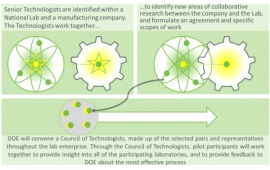by Brianna Crandall — April 24, 2015—On Tuesday, the U.S. Department of Energy launched the $2 million Technologist in Residence (TIR) pilot as part of its Clean Energy Manufacturing Initiative (CEMI) , to strengthen U.S. clean energy manufacturing competitiveness and enhance the commercial impact of its national laboratories.
 TIR is intended to catalyze strong laboratory-industry relationships that will lead to high-impact collaborative research and development (R&D).
TIR is intended to catalyze strong laboratory-industry relationships that will lead to high-impact collaborative research and development (R&D).(Click on image to enlarge)
TIR is intended to catalyze strong laboratory-industry relationships that will lead to high-impact collaborative research and development (R&D) and will develop mechanisms to help interested companies more easily connect and form relationships with the Department’s national labs moving forward.
With the launch of TIR, the Energy Department released a two-month competitive solicitation to invite the national labs to partner with industry and apply for TIR in “technologist” pairs. The competitively selected technologist pairs will comprise one senior technical staff member from a national lab and another from a manufacturing company or consortium of companies.
Over the two-year TIR pilot, each technologist pair will work together to first identify the technical challenges of interest to the participating company or consortium and the resources and capabilities within the national laboratories that may address them.
The pair will then propose collaborative R&D efforts to address the identified challenges in industry-relevant technologies including (but not limited to) developing advanced controls in smart manufacturing, increasing the efficiency of next-generation electric machines, and other R&D to enhance manufacturing of clean energy technologies or to reduce energy intensity in any manufacturing process. In addition, the teams will develop a framework partnership agreement with specific scopes of work, which would take place outside of the TIR pilot.
Additionally, the pilot will organize a Council of Technologists that will broaden the partnerships beyond the “one-company, one-lab” model. The Council will function as a network across the national lab system to promote labs’ industry-relevant resources and help form partnerships. Most importantly, the Council of Technologists will meet throughout the pilot to provide individual feedback that the Energy Department will consider in order to develop a clear, streamlined set of best practices to help other interested companies establish similar relationships with national labs beyond the pilot’s duration.




